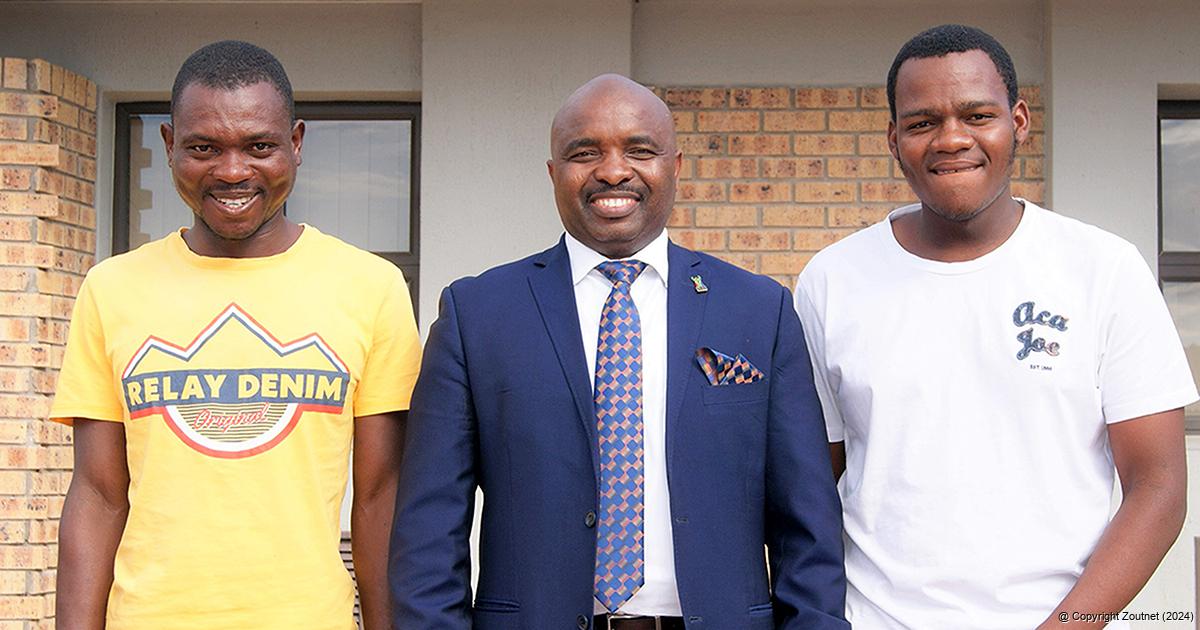

ADVERTISEMENT:

The founder of the Planting Cattle in Villages Programme, Pastor Humbulani Jonas Vhulahani (middle), captured with Tshimangadzo Tuwani (left) and Romeo Mudau (right), the beneficiaries who each received a free cow.
'Planting' cattle to uplift villages
Tshimangadzo Tuwani, Romeo Mudau and Maria Ndou were the first three people to receive a free cow each from the Planting Cattle in Villages Programme (CVP) during a function held on Friday, 20 May, at Tshipise Tsha Sagole village.
The CVP is an initiative of the Mount Nwali Muhulu God Resting Place Foundation, which was founded in 2017 by Pastor Humbulani Jonas Vhulahani at Tshivhongweni village outside Musina. The foundation was named after Mwali Muhulu, a historical mountain found at Tshivhongweni village.
Nwali Muhulu means “The Great God” in Tshivenda and is believed to be the resting place of Nwali (God) before he went to Makonde to deliver messages to his people many years ago.
According to Pastor Vhulahani, the foundation aims to eradicate poverty and hunger through sustainable, value-based holistic community development, while creating economic opportunities for the poor and underprivileged.
The CVP purchases a cow from a customary farmer in a specific village and donates it to an identified needy beneficiary. “When the cow gives birth, the calf is donated to another identified beneficiary in the next village. The same process goes on in a form of a chain. We aim to provide self-sufficient wealth creation and sustainable livelihood and to create a spider web kind of community development through donating cows, which we buy from our own pockets because we don’t have sponsors. The target group includes widowed women, orphans and people living with disabilities who receive the cows every year on 26 December.”
Vhulahani said the project operated in all 14 villages under Ward 10 in the Musina Municipality. “In each village, we have a local village committee that identifies and recommends beneficiaries to the foundation. The local village committee also makes sure that the whole family benefits, rather than just one person, and monitors the well-being of the cattle at the beginning of the handover until the owners are able to raise them on their own. It also has the responsibility to request the local community for an exchange if the first calf born is a male [bull]. We have set a target of at least 1 000 families to benefit from this project in 10 to 20 years.”
He urged individuals and stakeholders who would like to assist in growing the initiative to contact him on 083 447 4502 or 082 442 3623.
One of the beneficiaries, Tshimangadzo Tuwani from Zwigodini village, said the initiative would help him to improve his situation as he did not have parents. “With this start, I plan to have my own herd of cattle over the years, which will ultimately help me to accumulate wealth to support my family. Cattle are an integral part of our lives here in rural villages because they play an important role in our economic activities,” he said.
News - Date: 28 May 2022

Recent Articles
-

Bekende akademikus verloor stryd teen kanker
26 April 2024 By Andries van Zyl -

Former mayor of Tshwane, Dr Murunwa Makwarela, passes away
26 April 2024 By Victor Mukwevho -

Community relieved after suspect gets caught
26 April 2024 By Elmon Tshikhudo -

Ystervrou van die Bosveld oorlede
26 April 2024 By Pétria de Vaal

